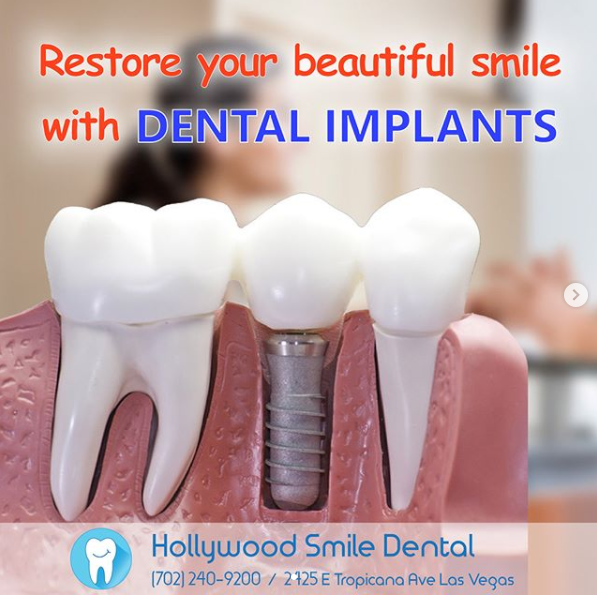A dental implant is a small “anchor” made of titanium. It is inserted into the jawbone to take the place of your missing tooth root. After osseointegration, or when the surrounding bone has attached to the implant, a replacement tooth is secured to the top of the implant. The new tooth looks, feels, and performs just like your natural teeth.
Dental implants can be used in a variety of situations, whether you need to replace a single missing tooth or many teeth. They can even be used to replace a full denture. As anchor points, implants can also securely attach a partial denture or bridge
Dental implants have given countless patients many amazing benefits.
• You will smile again
• Improved appearance
• Improved comfort
• Improved speech
• Eat better, enjoy more foods, better nutrition . Convenience
• Improved self-esteem
Dental implants are also a great value for your investment. You will be getting a product that you will be using 24 hours a day, 7 days a week, 52 weeks of the year, probably for many, many years of your life.
The first step in the dental implant process is the initial consultation and examination. Dental implants are not for everyone, so the dentist will examine your teeth and take X-rays to determine if your jawbones are healthy enough to receive implants.
• Dental implants can be used to replace a single tooth, so that grinding down or altering adjacent teeth is
• no longer necessary
• Dental implants can be used as anchors to support a fixed bridge
• Dental implants can support loose teeth by being splinted to them
• Dental implants can support replacement teeth for an entirely toothless jaw
• Dental implants can provide stability for a complete denture, thereby eliminating unsightly moving and
• clicking associated with dentures
The actual procedure for dental implants involves two stages. On the first appointment, your dentist will need to insert a metal implant that acts as the root for the new tooth
This first appointment will likely proceed as follows:The dentist will administer anesthesia at the location of the dental implant. This first appointment will likely proceed as follows:
- The dentist will administer anesthesia at the location of the dental implant.
- The gum tissue is opened to expose the bone.
- A special drill is used to create a hole in the jawbone for the metal implant.
- The implant is placed in the bone, and the gum tissue is stitched together or a cover screw is placed over the implant.
The healing process that follows is called osseointegration. Basically, the implant bonds to the bone, ensuring the durability of the dental implant. Osseointegration usually takes about three to six months.
- The second visit occurs after osseointegration is complete.
- This procedure usually goes as follows:
The implant is re-exposed and a post is attached. A crown is placed over the post and the procedure is complete.
In some cases, a temporary crown is placed on the post so that the gums can heal around the shape of a natural tooth while a permanent tooth or teeth are made. Once the gum tissue has healed, the permanent crown replaces the temporary one.
Most people with missing or broken teeth are good candidates for dental implants or mini dental implants. However, there are some limitations. Those who do not qualify for dental implants include individuals on immune-suppressing medication and children (you need all your adult teeth).
In addition, you need to have a solid bone structure for the implants to be successful. If the bone is weakened, implants can be applied after the bone is strengthened or re-grown through bone grafting.







